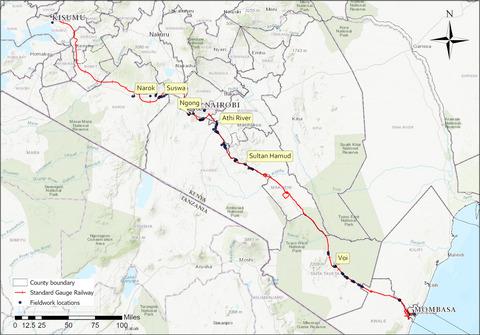当前位置:
X-MOL 学术
›
Trans. Instit. Br. Geogr.
›
论文详情
Our official English website, www.x-mol.net, welcomes your
feedback! (Note: you will need to create a separate account there.)
Infrastructure as techno-politics of differentiation: Socio-political effects of mega-infrastructures in Kenya
Transactions of the Institute of British Geographers ( IF 3.3 ) Pub Date : 2021-05-28 , DOI: 10.1111/tran.12474 Gediminas Lesutis 1
Transactions of the Institute of British Geographers ( IF 3.3 ) Pub Date : 2021-05-28 , DOI: 10.1111/tran.12474 Gediminas Lesutis 1
Affiliation

|
The Standard Gauge Railway (SGR) in Kenya, inaugurated in 2017, has been promoted by the Kenyan government as a promise of “development” and “prospering people.” This paper demonstrates how, contrary to these narratives, the SGR reiterates the pre-existing relations of difference mediated by class, geography, and ethnicity. Focusing on material and semiotic forms of the SGR infrastructures, it specifically shows how the railway project functions as the techno-politics of differentiation that governs by including “prospering publics” of urban middle classes into Kenya's modernist development vision, providing unstable hopes for “development” to more precarious peri-urban and rural “anticipating populations,” but simultaneously constituting “excluded populations” in rural landscapes that are denied the possibility of being a part of the national modernist development vision. Highlighting this intimate relationship between infrastructure, governance, and biopolitics, the paper demonstrates that mega-infrastructures – differentiating between the publics included in, and the populations excluded from, the state's development visions and practices, as well as unstable subjective dispositions in-between – engender modalities of non-belonging that fall outside of (inherently liberal) frames of “citizenship” or a “public” frequently employed in critical infrastructure scholarship.
中文翻译:

基础设施作为差异化的技术政治:肯尼亚大型基础设施的社会政治影响
肯尼亚标准轨距铁路 (SGR) 于 2017 年开通,被肯尼亚政府宣传为“发展”和“人民繁荣”的承诺。本文展示了与这些叙述相反,SGR 如何重申由阶级、地理和种族介导的预先存在的差异关系。重点关注 SGR 基础设施的物质和符号形式,特别展示了铁路项目如何作为差异化的技术政治发挥作用,将城市中产阶级的“繁荣的公众”纳入肯尼亚的现代主义发展愿景,为“发展”提供不稳定的希望”到更不稳定的城郊和农村“预期人口,”,但同时在乡村景观中构成“被排斥的人口”,被剥夺了成为国家现代主义发展愿景一部分的可能性。该论文强调了基础设施、治理和生命政治之间的这种密切关系,并论证了大型基础设施——区分包括在国家发展愿景和实践中的公众和被排除在外的人群,以及介于两者之间的不稳定的主观倾向——产生不属于(本质上是自由的)“公民身份”或“公众”框架之外的非归属方式,这些框架经常在关键基础设施研究中使用。
更新日期:2021-05-28
中文翻译:

基础设施作为差异化的技术政治:肯尼亚大型基础设施的社会政治影响
肯尼亚标准轨距铁路 (SGR) 于 2017 年开通,被肯尼亚政府宣传为“发展”和“人民繁荣”的承诺。本文展示了与这些叙述相反,SGR 如何重申由阶级、地理和种族介导的预先存在的差异关系。重点关注 SGR 基础设施的物质和符号形式,特别展示了铁路项目如何作为差异化的技术政治发挥作用,将城市中产阶级的“繁荣的公众”纳入肯尼亚的现代主义发展愿景,为“发展”提供不稳定的希望”到更不稳定的城郊和农村“预期人口,”,但同时在乡村景观中构成“被排斥的人口”,被剥夺了成为国家现代主义发展愿景一部分的可能性。该论文强调了基础设施、治理和生命政治之间的这种密切关系,并论证了大型基础设施——区分包括在国家发展愿景和实践中的公众和被排除在外的人群,以及介于两者之间的不稳定的主观倾向——产生不属于(本质上是自由的)“公民身份”或“公众”框架之外的非归属方式,这些框架经常在关键基础设施研究中使用。











































 京公网安备 11010802027423号
京公网安备 11010802027423号